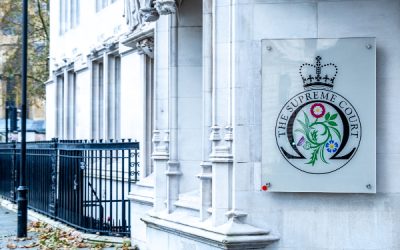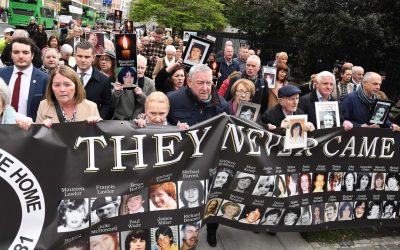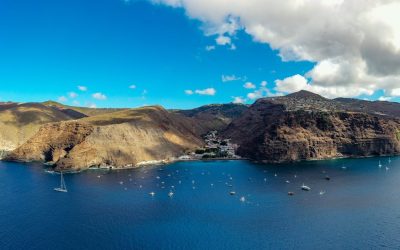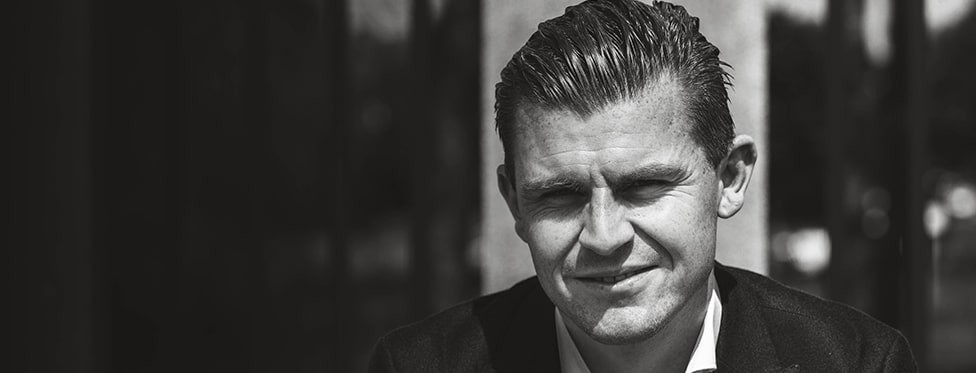
‘The ugly truth’
‘The truth is often ugly. That’s why it gets buried.’ Human Rights Solicitor Darragh Mackin has finally helped to deliver justice for the Stardust families after a 43-year delay. He pulls no punches in his interview with Mary Hallissey
The full article is available on the Law Society of Ireland’s website here.

Truth, justice, and accountability for a troubled past – these are solicitor Darragh Mackin’s watchwords. He has been described as the hero of the Stardust fire story. As the families’ lawyer, Mackin has scored a notable victory in their long and dogged battle for justice and truth for their loved ones.
The solicitor believes that the truth is often ugly. That’s why it gets buried, with processes used to subvert it.
But reconciliation to an often complex and ugly past means acknowledging wrongdoing and then apologising, he says.
“Truth comes first, and it’s the most important cornerstone of any functioning democracy and justice system. If you’re not telling the truth, how can you say sorry for what has been done?”
The solicitor’s grasp of the potential use of the inquest system to right historical wrongs was pivotal in finally wresting an apology from the State and Taoiseach Simon Harris. The apology came 43 years after the events of that tragic night on Dublin’s northside, on 14 February 1981.
The Stardust families didn’t have confidence in the justice system because they were shut out, and the truth buried deep, the solicitor says.
Mackin praises Simon Harris for taking the time to meet the families in person and to acknowledge the humanity of the dead. The Taoiseach read short biographies of each person who died in the blaze in his speech to the Dáil on 23 April. This engagement and response was a mark of humanity, Darragh Mackin says. “The State recognised that something really bad had been done.”
Making a difference
33-year-old Mackin is from Camlough near Newry, Co Down, equidistant from both Dublin and Belfast, and feels equally at home in both cities.
The married father of two grew up with a strong awareness of both human-rights abuses and State violence in the North in the years prior to the peace process. There was no tradition of law in his family but big community involvement – a park in Newry is named after his late grandfather, community volunteer Jack Mackin.
His primary-school principal father steered him towards law at the University of Ulster as a means of helping his community.
“I wanted to help people. I just liked the idea of working with people to make a difference,” Mackin says. “When I was growing up, I consistently heard stories about my grandfather. At a time of huge conflict, he was trying his best to ensure that children would have access to sport. He was a great believer in justice and children’s rights, at the time.”
Darragh spent a couple of college years “partying and having a great time” until he met his now wife Ciara.
“Ciara had a clear path for where she wanted to go. She helpfully brought me into line and made me start thinking about trying to get some legal practice,” he says.
In second year, Darragh’s college attendance was so poor that he was threatened with expulsion – a fact he now jokes about with former lecturers at University of Ulster dinners.
Changing everything
With no legal connections, Darragh secured an internship through Kevin Winters (KRW Law), a fellow alumnus of St Colman’s College in Newry.
“I emailed him out of the blue and said: ‘We went to the same school, is there any chance you’d take me in and give me a go?’” That email resulted in two weeks’ work experience, which led on to summer work and, eventually, a full career in law.
Putting the black-letter undergraduate law he had absorbed into actual practice changed everything for Darragh: “Once I got into practice, it completely changed who I was and it changed for me what law was about,” he says.
Using his legal knowledge to make a difference in people’s lives made it real. He gave up on the idea of a corporate lifestyle to focus on being a criminal lawyer, initially working with troubled youths and prisoners: “Human rights and criminal justice in prisons was where it started, and that spun naturally into human rights with a focus on the past,” he explains.
He acted in cases where the dead had been wronged by the State, such as the shooting in August 1976 of 12-year-old Majella O’Hare, and the killing of the Reavey brothers – Anthony, John Martin and Brian – in Armagh the same year.
“These were circumstances where, in a functioning democracy, you should never need a lawyer to get what the families wanted – truth, justice, and accountability. Unfortunately, in the North, it doesn’t happen like that, and you are forced to go to court.”
Human Rights: Sword or shield?
Darragh says he quickly discovered the purpose of human rights – to make a real-life difference.
“Is the European Convention on Human Rights a sword or a shield? It’s effectively both – it protects people but, equally, when the State does wrong, it can be used as a sword.”
Mackin saw the potential of the coroner system for uncovering the truth of what happened at the Stardust on that terrible night of 14 February 1981, when 846 patrons were admitted, some underage but most between 18 and 25.
“In my view, the wrong answer was being given because the wrong question was being asked,” he said of previous Stardust inquiries. “I had seen at first hand how the inquest system works. The coronial system, when it works, works very well because it puts families at the centre of the process. It now has the additional protections of the European Convention on Human Rights, which means that it has more teeth than we would ordinarily associate with an inquest.
“It would give the families access to the documentation at first hand, and access to their own experts. For me, it was an obvious avenue to take,” he says.
Entirely innocent
“The reality, when you look at the first inquiry, is that it just beggars belief how the conclusion of probable arson was ever reached. Looking at the report, it’s clear there was no evidence of arson,” he said.
“People forget the damage that the arson finding did. It criminalised all these families, and all these victims. People who had suffered life-changing injuries – was it one of them who had started this fire?
“People forget the damage that stigmatisation did,” Mackin says. “When you speak to the families, it’s the one thing that consistently stands out – the hurt that that caused.
“When the Taoiseach apologised, he made it clear that there was never any evidence of arson, and that these people were entirely innocent. In the story of the Stardust, that fact is almost lost.
“The damage that has been done is untold. It underlines the importance of truth recovery.”
Locked doors
That the locking of nightclub exit doors was not uncommon in the pre-Stardust era is contested by Mackin.
“Firstly, it’s debatable whether it was common practice. Secondly, there were clear bye-laws in place that it should not be done. Thirdly, the chains remained on the doors while people were on the premises, and that contributed to the loss of many, many lives.
“While people may say it was common practice, it was never acceptable to put metal plates over toilet windows – it was tantamount to a fortress. To this day, those photographs of handprints on the windows will never leave my mind.”
Mackin believes that, given the evolution of human rights, people are more likely to stand up against the status quo and fight for truth and justice.
“The Keane Inquiry’s greatest strength was its greatest weakness. It was fixated on expedition and expediency, turning this inquiry around within days. It was the wrong approach in a case like this,” he states.
The circumstances were that many families were either still grieving or physically recovering in hospital and were in no state to try and find or establish the truth, when their input would have been invaluable.
“That is a symptomatic factor, in the fact that the inquiry almost continued being driven by lawyers, rather than the families themselves.”
The beauty of the rule of law is that the Stardust owners were fully entitled to test the lawfulness of the verdict, Mackin adds. However, the timing – after closing submissions, but before the jury went out – risked the jury being discharged and the entire process being halted, he says.
The timing of the second judicial review to halt the inquest finding of unlawful killing, taken by Stardust owner Eamon Butterly, was “disappointing and frustrating”, he adds.
Redress mechanism
Redress has never been an important factor for the Stardust families, Mackin says. They wanted an acknowledgement and an apology for what happened.
“Given that an apology has been delivered and the truth has now been told, the next part in the reconciliation process is that the State ensures that they are compensated for the damage that has been done to them for all those years,” he says.
His firm, Phoenix Law, is engaging with the Government to see what redress mechanism will work best in an unprecedented situation: “For me, this requires something totally different – and that payments are made to these families in a way that reflects what they’ve been through.”
The families are the heroes of this story, their lawyer states.
“They became much, much more than clients to us, we were truly privileged to act for them. They would have done anything for us, to make us welcome. They genuinely became lifelong friends.”
He salutes the dogged determination and unparalleled commitment of the families: “Many people would have given up after one decade, never mind four,” he says. “They are absolutely incredible people. When you are on the right side of the truth, you’re never going to lie down.
“These families are now at peace with what they have achieved, knowing that their loved ones are no longer a number. The truth has now been told. They were innocent and they were unlawfully killed. For me, that has brought all those victims home.”
Clear vision
Mackin was one of the founders of Belfast-based Phoenix Law, moving on from KRW Law in 2018. Then 27, Darragh had a clear vision of what he wanted – a niche human-rights law firm that would work on an international stage but retain a commercial feel.
The initial six-strong team has now grown to 37 and the firm has taken instructions globally. Phoenix Law has no one lawyer’s name above the door and operates a democratic structure. Every member of staff has a say in the direction the firm takes and, uniquely, none of the staff has a family background in law.
As the father of two infant daughters, Darragh wants to also acknowledge the wider family sacrifice for a lawyer taking on a long and intense case, such as the Stardust inquest.
“We can never forget the family members who aren’t on the front line – it’s the families who deal with that commitment, and don’t get the credit they deserve.”
The only way to take on the Stardust case was to commit the time and to work in Dublin from Tuesday to Friday each week, he says: “We basically ran everything from our hotel [the Mayson Hotel on Dublin’s quays], and the staff were so good to us.”
In from the cold
He pays warm tribute to Dublin City Coroner Dr Myra Cullinane, who “brought the families in from the cold”.
“The families had no faith in the system, and she restored that faith by making sure they were listened to and given a fair crack of the whip,” he says.
The sharing of pen portraits of the dead was novel, and Mackin hopes that the practice will continue in future inquests.
Has the State learned lessons from this? “Let’s learn this lesson,” Mackin says, pointing to the previous practice of garda selection of jury members for inquests.
“That was only changed for the Stardust [Inquiry] – it now needs to be changed across the board, as part of ongoing reform of the coronial process.”
The law favours the truth, he adds, but a gap remains for legal aid in human-rights and access-to-justice matters. Pointing to the Loughinisland massacre documentary No Stone Unturned, the human-rights lawyer says that the role of investigative journalists has been as important as that of lawyers as a truth-recovery mechanism.
“Information is power, and telling the truth is part of the process whereby the community fights back. This was a community that was repressed, with no access to justice, no access to truth. Through investigative journalism and litigation, they were telling their stories, and the truth was getting out,” he says.
Mackin is a natural leader and politician, but fears he wouldn’t have the necessary diplomatic temperament, despite the clear public hunger for politicians who truthfully speak their mind.
“I like the idea of making change, but I think it’s better delivered from outside the box, as a lawyer, holding politicians and the State to account. But equally, I’d never say never!”
Mary Martina Hallissey is a journalist with the Law Society Gazette.
A GOOD MAN CAME ALONG
Antoinette Keegan is a Stardust survivor who has campaigned relentlessly for justice for the 48 dead, which included two of her sisters, Mary and Martina. She sings the praises of Darragh Mackin for his endeavours on behalf of the families.
“He came and rescued us,” she said. “My late mother actually adored him, she used to say ‘Darragh is going to win it for us’.”
Antoinette recalled the families’ efforts to raise money for legal representation in the dark days after the blaze. In those early days, they borrowed the then-enormous sum of €1,000 from the bank, paid back with interest, to pay their first solicitor. They later did bucket collections in “hail, rain and snow”, as well as running evening functions.
Antoinette describes fundraising to pay expert witnesses, lawyers, researchers, and pathologists – all without legal aid.
Abandoned by the State
“We were on our own. We were left stranded, abandoned by the State, like lambs to the slaughter. I used to have nightmares if I walked down there [Stardust site],” said Antoinette. “And we’ve got justice now.”
She recalls her late father John, who was superstitious, asking his four eldest children not to go to the disco, because it fell on Friday 13th. Antoinette said everyone looked beautiful that night, dressed up for the disco-dancing competition. “It was a night that we had built ourselves up for.”
No charge
In 2017, after years of fruitless campaigning, a good man came along. Solicitor Darragh Mackin’s telephone number was given to Antoinette by Senator Lynn Boylan, saying he wanted to help. “And I said, how much is he going to charge? And I was told, he’s not going to charge anything; he wants to help us.”
Antoinette brought all her paperwork to that first meeting with Mackin – the various reports, as well as the coroners’ reports on her sisters Mary and Martina.
“I kept asking for reports because I was with them that night, I was the last person with [the dead] that night, and I wanted to know what happened to them,” Antoinette said.
Darragh Mackin looked through the reports and pushed them all aside. He said: “We’re not going to look for a new inquiry from the Government. We’re going to look for the inquest to be reopened.”
“I said, ‘I’ve already done that, Darragh’, and he said, ‘let me try’,” recalled Antoinette.
New inquest
The families gathered 48,000 signatures requesting a new inquest in the public interest. In March 2019, an application was made to then Attorney General Seamus Wolfe. A 37-page submission was filed by Phoenix Law on behalf of Antoinette Keegan and relatives of 42 of the 48 people who died in the fire.
The Attorney General granted the request, saying the case was similar to Hillsborough. Antoinette believes this wouldn’t have happened without Mackin’s input.
“The Attorney General would never have done that if it wasn’t for Darragh Mackin. He’s an absolutely brilliant solicitor and I commend him. I will thank him until the day I die, for coming a long way, and helping us. We would never have done it without Darragh Mackin and all his legal team. We were always up against the State and we always lost.”
Antoinette also points to Mackin’s success in getting legislation through for payment for a new inquest jury.
Antoinette’s campaign was always for her two sisters, and the 46 other victims, though many didn’t know each other before the fire. “We became one big, huge family, united in grief for the biggest disaster in the history of the State.”
After years of closed doors, knockbacks, and blank refusals to engage, Antoinette is now feeling stronger.
“The insults that were thrown at us over the years were disgraceful. My mother was told by an official that she had two less mouths to feed.
“How dare they speak to my parents that way about their loved ones. That’s what gave me the determination. It was shocking the way we were treated.”
There were times Antoinette felt like giving up. She credits her parents’ determination to never let the injustice go, and carried on their campaign after they died.
“Darragh Mackin didn’t leave a stone unturned. He was absolutely brilliant in everything he did for us, and never asked for one cent. He said, ‘I don’t care about money, I know I’m going to win this’.
“What a fantastic job he did for us, I’ll keep thanking him until the day I die. He is one brilliant solicitor and I’ll never take that away from him. No words can show the gratitude that my family has for him. It was a long road and it wasn’t easy. It cost – emotionally, psychologically, physically, and financially, and it cost time,” she said.
The most hurtful part was being told by officials to go home and get over it. “They knew quite well all along that this was all wrong. But they closed the door on us, until a human-rights solicitor came along. I just class him as the best solicitor I’ve ever met in my whole life.
“I recommend him to anyone who has a human-rights problem against the State. He helped us so much. It’s immense.”
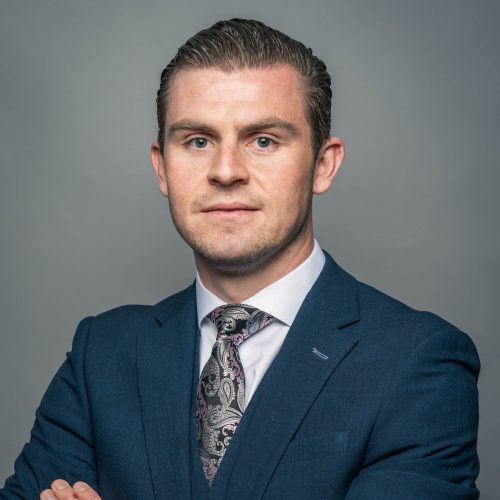
Darragh Mackin
PartnerDarragh Mackin has been described as ‘a rising star on the international legal scene’ (Irish Times), a ‘Champion of the Cause’ (The Parchment) and ‘a man for all seasons, needed for all sorts of reasons’ (Belfast Telegraph). In July 2016, Darragh was the first ever Ireland based Lawyer to be nominated, and in turn to win, an award at the prestigious London Legal Aid Lawyer of the Year Awards. In 2025, he was one of the Partners that led the team to winning the LEAP ‘Special Recognition Award’ in Dublin and the LALY ‘Law Firm of the Year’ Award in London.
He has developed a specialist practice in Human Rights, Public Law, Litigation and International law. He has appeared in some of the most high profile cases in Ireland and Internationally. This includes acting for the Hooded Men in their victory in the London Supreme Court, for Sarah Ewart in her challenge to the law on Abortion in Northern Ireland, the families in the Stardust fire Inquest in which a verdict of Unlawful Killing was returned and acting for the Irish rap group Kneecap in their successful challenge to Kemi Badenoch and her decision to withhold funding for the group. He currently acts for the Summerland families in their campaign for a fresh investigation into the fire on the Isle of Man.
He regularly advises high profile individuals and companies both domestically and internationally, with a particular specialism in Reputation Management, Defamation and Data Protection. Given Darragh’s unique experience, he has become the go to lawyer for actions with a digital perspective, appearing in the landmark successful challenge to voice recognition technology and in the first domestic case relating to Cryptocurrency. His unique specialism in the field of digital evidence has resulted in him often being instructed in complex commercial litigation involving data protection principles, the use of AI (artificial intelligence) and the misuse of the internet and social media platforms.
He has acted in cases at all levels including in the Supreme Courts in London and Dublin, The European Court of Human Rights, the African Commission on Human Rights and the United Nations Special Procedures.
He has acted for some of the most well known non-governmental organisations including Amnesty International, the Association of Personal Injury Lawyers, and Extinction Rebellion. He has been instructed and advised on cases all around the World, including the USA, Spain, France, Italy, Sri Lanka, Malawi, the Cayman Islands and St Helena. His unique international law experience has resulted in him often being instructed to advise Irish and British Citizens overseas on issues of international law.
Darragh has also successfully secured some of the largest settlements in the jurisdiction including the payment of £16.7million to NI Taxi Drivers arising of the NI Covid Pandemic and €24million to the families of the Stardust fire. He is currently retained in a high value claim on behalf of a Chinese based company initiating action in Belfast, and in a multi million euro claim in Dublin, arising out of insurance contracts to hoteliers during the covid pandemic.
In addition to practice, Darragh is an associate lecturer of Public and Administrative Law at the University of Ulster and has delivered a number of guest lectures at Cambridge University, Trinity University, Queens University Belfast, and Dublin City University.
NOTABLE CASES
HUMAN RIGHTS & PUBLIC LAW
Sarah Ewart & Amnesty International (The Abortion Litigation)
Darragh has appeared in many of the seminal human rights cases in recent times in Ireland. He acted for Sarah Ewart and Amnesty International to which saw the law changed in respect of abortion in Northern Ireland. Darragh was also labelled The Times ‘Lawyer of the Week’ for his work on this case.
The Hooded Men (Ireland v UK)
Darragh was instructed in the landmark torture case of the Hooded Men in the application for revision of the Ireland v United Kingdom 1978 decision by the European Court of Human Rights. Following Darragh’s success before the UK Supreme Court that the decision not to investigate was unlawful, the Chief Constable formally apologised to the Hooded Men.
The relevant media footage can be accessed here: CNN, RTE, BBC, and the Journal.
JR87 – Challenge to Religious Education in Northern Ireland
JR87 was the landmark legal case on behalf of a child who challenged the nature of religious education (RE) and collective worship in Northern Ireland schools. In 2025, the London Supreme Court found that the exclusively Christian-focused RE and collective worship, as delivered under the existing core syllabus in NI schools, breaches the human rights of children and parents. The case has far-reaching implications for education law across the UK.
The relevant media footage can be accessed here and here.
Aidan McAnespie
Darragh was instructed by the family of Aidan McAnespie who was killed by a British Soldier having been shot in the back whilst walking to a football game 1988. On June 2018, on foot of an application lodged on behalf of the family, a decision was taken to prosecute David Holden for the killing. In February 2023, this resulted in the first prosecution of a British Soldier post the Good Friday Agreement.
The relevant media footage can be accessed here and here.
The Judgment can be accessed here.
The Brexit Case – Gina Miller No.1
In 2016, Gina Miller initiated legal action arising out of the controversial use of the then Government’s prerogative to execute Brexit, and to leave the EU. A group of individuals including two British citizens living in France, a Gibraltarian national, a Welsh citizen and Fergal McFerran, president of NUS-USI formed the ‘peoples challenge’. Darragh was instructed as part of the legal team compiled to represent the peoples challenge in the Brexit Supreme Court case. This case has been dubbed by legal commentators as one of the most significant constitutional cases of the decade.
The relevant media footage can be viewed here and here.
The Legacy Act – Martina Dillon & Others
Darragh was instructed as part of the team on behalf of the lead applicants in the seminal case which challenged the British Government’s contentious ‘Legacy Act’ which sought to enact legislation to grant amnesties and immunity to perpetrators for acts committed during the period known as a ‘the Troubles’ in Northern Ireland. The NI Court of Appeal found that certain provisions of the legislation were unlawful and incompatible with human rights.
The relevant media footage can be accessed here.
Other Cases:
The Glenanne Series: Re Edward Barnard judicial review successfully compelled the PSNI to investigate the murders of more than 120 people arising out of allegations of state collusion. The Court found it was unlawful not to investigate, and as a result, an independent police force was tasked to investigate (Op Denton).
Loughgall (Re Brigid Hughes): Instructed by the Loughgall Truth & Justice Campaign and the families bereaved as a result of the shootings at Loughgall on 8th May 1987. Darragh successfully secured a fresh inquest following a judicial review challenge to the decision by the Secretary of State to issue a ‘National Security Sensitive’ Certificate. Following this, Darragh appeared in the landmark case of Re Brigid Hughes which found that the then former first Minister Arlene Foster MLA had acted unlawfully in failing to release the funding for Legacy Inquests. The relevant media footage can be accessed here:
Legacy Victims Pensions: Re Brian Turley was the successful judicial review against the Government to implement and fund the Legacy Victims Pension Scheme. The relevant media footage can be accessed here and here.
Covid School Closure: Re JR105 was the judicial review taken by the parent of the child at the inception of the Covid Pandemic arguing for their immediate closure to protect life. The case was widely reported here, here and here.
INTERNATIONAL
Kneecap
Acted for the Irish Rap Band Kneecap in their challenge to the decision by the British Government to charge Mo Chara with terrorist offences following a concert in London. Instructed by the band to lead their International legal team which involved proceedings in London, USA and Canada.
Ibrahim Halawa
Darragh acted for the Irish Teenager, Ibrahim Halawa, who was detained whilst on holiday in Cairo, Egypt and who was put on mass trial at risk of the death penalty. Darragh acted for Ibrahim in seeking his return to Ireland, making submissions before the EU Parliament, the African Commission on Human Rights and the United Nations. In October 2017 Ibrahim Halawa was acquitted of all charges before the Egyptian Courts and repatriated to Ireland.
Media coverage of the UN Intervention is available here. The relevant media footage can be accessed here and here.
Carles Puigdemont
In 2018, Darragh was one of the lawyers who travelled to Brussels to meet the then president of Catalonia, Carles Puigdemont and provided advice and assistance in respect of his ongoing bid against the extradition proceedings issued by the state of Spain.
Private Sean Rooney
Instructed on behalf of the Irish Soldier Private Seán Rooney who was murdered whilst on peacekeeping duty in Lebanon on behalf of the United Nations. Darragh appears domestically before the Coroner’s Court in Dublin for the family, and is retained to advise on the criminal proceedings currently ongoing in Lebanon.
The Tamil Community
Darragh was retained on behalf of a number of individuals from the Tamil Community in a variety of actions arising out of the conflict in Sri Lanka. He acted in a ground-breaking case in for a Tamil widow against the PSNI in seeking damages for their role in providing training to the Sri Lankan police in 1986. In addition, he was retained to act on behalf of an individual who challenged his conviction for involvement with the Tamil Tigers, on the basis that the trial process was contrary to international law, and the confession was obtained by torture.
The relevant media footage can be viewed here and here. The Tamil Guardian also covered the story here. In addition, the latter case can be accessed here.
Lisa Smith
Lisa Smith was a former Irish army soldier who travelled to Syria, and was eventually detained by the Turkish authorities as a suspected ISIS fighter. Darragh acted for Lisa in successfully securing her and her daughter’s repatriation to Ireland. The UN Special Rapporteur on Human Rights & Counter Terrorism intervened in Lisa’s case. Lisa was the first alleged ISIS bride ever to be returned to Ireland.
The relevant media footage can be accessed here and here.
Encrochat – French Court of Cassation
Instructed with Binsard Martine in the landmark challenge on behalf of Sam McCaughey before the French Court of Cassation regarding the admissibility of the Encrochat evidence in Courts in Northern Ireland. This is the first challenge of its kind launched on the international sphere challenging the admissibility domestically in NI.
The media coverage of the case is available here.
Other Cases:
Keyu & Others (UK Supreme Court) case relating to the massacre at Batang Kali, Malaysia. Acted for the interveners the Pat Finucane Centre and Rights Watch UK.
Bilal Abdul Kareem v Gina Cheri Haspel et al (USA Court of Appeal District of Columbia) – Proceedings against the American State policy on the use of drones in the taking of life.
REPUTATION MANAGEMENT AND DEFAMATION
Bob Vylan v RTE
Instructed on behalf of the musician Bob Vlyan in his defamation proceedings against the Irish National Broadcaster RTÉ arising out of his performance at Glastonbury.
Kneecap v Vince Gasparro
Instructed on behalf of the Irish Rap Group Kneecap in their defamation proceedings against the Canadian MP Vince Gasparro arising out of a video to which he published on the social media site X (formerly known as Twitter).
Actions against Big Tech
Darragh has been instructed on a number of occasions to sue big tech in which social media, the internet, or AI has been misused. This has included bringing proceedings having data deleted from the internet under the principles of the right to be forgotten (OH v Google), injunctions seeking the removal of content published online (the case of ZXY) and suing for damages in which Big Tech or the Social Media giants have acted improperly or unlawfully (the Facebook moderator case and EH v Meta).
Other Cases:
Re Fine Point Films – Darragh acted for the International media organisations, Index on Censorship and the English PEN who intervened in the successful judicial review challenge to a search warrant imposed on two investigative journalists, Trevor Birney and Barry McCaffrey.
Phil Miller – acted for the renowned investigative journalist Phil Miller in an appeal against the Information Commissioner relating to a report withheld by the PSNI regarding the structure of MI5 in 1973.
COMMERCIAL AND LITIGATION
High Value Commercial Litigation
Darragh has been instructed in some of the highest value commercial claims before the Courts in Ireland and the UK, to include:
- Instructed in a seven figure claim on behalf of a number of Hotel Owners arising out of business interruption insurance during the covid pandemic in Dublin.
- Has acted for a Chinese Pharmaceutical Company involved in litigation based in Belfast arising out of events in China.
- Secured a payout of £16.7million on behalf of all NI Taxi Drivers following the failure to compensate them during the Covid 19 Pandemic.
- Instructed on behalf of a high profile Irish Businessman against the Irish Government for breach of contract which resulted in a seven figure payout.
- Six Figure Resolution for a New York company who were involved in Litigation in both London and Belfast.
- Instructed in the first ever High Court litigation in Belfast arising out of Cryptocurrency and Cryptocurrency fraud.
Negotiation and Mediation
Given his experience, Darragh is regularly involved in negotiating and mediating disputes between Commercial and Corporate entities whereby disputes have arisen between Shareholders or Company Officers. This experience has resulted in Darragh being retained in various disputes both locally and internationally.
Email:darragh@phoenix-law.org
Phone:+4428 9032 8383

